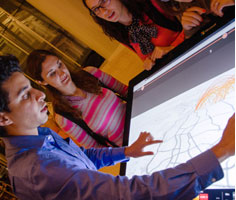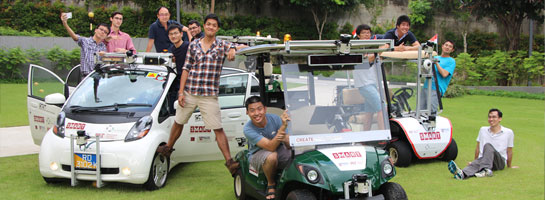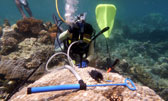




Three research teams from the Singapore-MIT Alliance for Research and Technology (SMART) – MIT’s research enterprise in Singapore – alongside their partner institutions, have been awarded Intra-CREATE grants by the National Research Foundation (NRF) Singapore. The grants are part of the NRF’s initiative to bring together researchers from institutions under the Campus for Research Excellence and Technological Enterprise (CREATE) in order to achieve greater impact from collaborative research efforts.
The first two grants have been awarded to researchers from SMART’s Disruptive & Sustainable Technologies for Agricultural Precision (DiSTAP) interdisciplinary research group (IRG) to develop food packaging capable of detecting foodborne bacteria, and a rapid test kit to rapidly assess gut health from blood serum and stool samples. The third grant is jointly awarded to a joint research team from SMART’s Antimicrobial Resistance (AMR) and Critical Analytics for Manufacturing Personalized-Medicine (CAMP) IRGs, for the development of a novel diagnostic technique capable of rapidly detecting low-abundance pathogens in biological samples.
Combining nanosensor technology and food packaging for foodborne bacteria detection
Hosted by SMART DiSTAP in collaboration with the National University of Singapore (NUS), the research project “Biodegradable silk-nanocomposite multifunctional films for sustainable, smart and active food packaging” aims to develop a protein-based, biodegradable and multifunctional food packaging solution capable of detecting and combating foodborne pathogens in real time.
Foodborne illnesses are often caused by bacteria, fungi, parasites and viruses, and food packaging plays an important role in maintaining food safety and freshness. However, conventional food packaging materials are passive barriers that can only delay the adverse effects of contamination, and many are made of synthetic plastics and petroleum-derived polymers which contribute to environmental waste and pollution.
Co-led by Dr Yangyang Han, Postdoctoral Associate at SMART DiSTAP, and Dr Tedrick Thomas Salim Lew, Assistant Professor at NUS’ Department of Chemical and Biomolecular Engineering, this novel and sustainable approach aims to enable early and real-time detection of specific foodborne bacteria. This will be achieved by replacing plastic-based packaging with nature-derived protein-based films with added stimuli-responsive nanosensors and antimicrobial hydrogels.
“Food safety and waste represent a major societal challenge with significant health, economic, and sustainability implications, and our goal is to provide a sustainable alternative to protect food safety while reducing spoilage and environmental waste,” said Dr Han. “The interdisciplinary nature of this project – which combines the fields of biomaterials, nanotechnology, food safety, toxicology, sustainability and microbiology – will result in a novel solution to better understand pathogen sources and spread mechanisms in the food supply chain.”
Point of care sensing kit to rapidly determine gut health from blood serum and stool samples
SMART DiSTAP’s “Rapid detection of Indole-3-propionic acid and development of Raman spectral library for gut health monitoring using a portable spectrometer (RIDRaGS)” project, which combines the expertise of researchers from SMART, MIT, National University Hospital (NUH), NUS Yong Loo Lin School of Medicine (NUS Medicine) and Duke-NUS Medical School, seeks to develop the first sensor capable of instantly detecting the presence of Indole-3-propionic acid (IPA) in blood serum and stool samples.
Digestive diseases constitute one of the highest disease burdens in our community, and persistent gut inflammation and microbial imbalance have been identified as key contributors to obesity, cardiovascular-metabolic diseases, accelerated ageing and cancer. IPA, a small-molecule metabolite produced by the human gut microbiota, is an emerging indicator of gut health as it regulates the gut immune response and inhibits excessive inflammation. Patients with active gut inflammation have depleted IPA levels, while recovery from the inflammation restores IPA concentration.
Co-led by Dr Mervin Chun-Yi Ang, SMART DiSTAP Associate Scientific Director, and Dr Lee Wei Jie Jonathan, Consultant at NUH’s Division of Gastroenterology & Hepatology and Assistant Professor at NUS Medicine, this project focuses on utilising portable spectrometers – which have been developed by DiSTAP for other biological applications such as non-invasive plant health monitoring – to rapidly detect IPA levels in blood or stool samples. This will help to enhance the efficiency of the testing process, as IPA is traditionally analysed through conventional mass spectrometry-based techniques and the use of specialised lab equipment.
“Nutrition, microbiome and anti-inflammatory approaches have received great attention in recent years and are hailed as some of the most promising research areas that will address the country’s healthcare challenges,” said Dr Ang. “Building on SMART DiSTAP’s success in customising portable spectrometers for different agricultural applications, we are excited to further develop these tools and see how they can be also applied to healthcare and medicine.”
Rapid diagnosis of infections and monitoring of cell therapy product contamination using electrostatic microfiltration
Hosted by SMART IRGs AMR and CAMP in collaboration with the Singapore Centre for Environmental Life Sciences Engineering (SCELSE), “Electrostatic microfiltration-based enrichment of low-abundance pathogens and improves downstream detection performance” seeks to produce a novel diagnostic technique capable of rapidly detecting low-abundance pathogens in biological samples.
When a patient is sick from an infection, particularly in their blood, it takes up to seven days to detect pathogens using conventional methods. This hinders timely and appropriate diagnosis and treatment, and worsens the prognosis. A similarly delayed process occurs in cell therapy product manufacturing, where it takes between seven to 14 days to evaluate the presence of contaminants such as bacteria, virus and fungi. Because cell therapy products cannot be sterilised, detecting contaminants early on to restart the production cycle is urgently needed so that the products can be delivered to patients quickly and safely.
The research team, led by Dr Yaoping Liu, Senior Postdoctoral Associate at SMART CAMP, and Dr Irvan Luhung, Senior Research Fellow at SCELSE, in their previous research, have developed electrostatic microfiltration as an effective sample preparation device for bacteria enrichment, and aim to integrate the microfilter with mainstream detection methods. This enables the bacteria to be detected via digital loop-mediated isothermal amplification – a form of polymerase chain reaction (PCR). The developed system will be rapid, single use, portable and easy to operate – with no requirement for a highly specialised facility. It will also be compatible with other advanced downstream detection techniques and can be easily embedded into existing commercial kits or facilities to further improve the performance of detection techniques.
“This project builds on on-going projects at SMART focused on separating viruses and bacteria – which are much smaller than mammalian cells – from biological samples, and could revolutionise the way pathogens are identified,” said Dr Liu. “The use of an efficient and relatively cost-effective method could significantly improve the prognosis of sepsis and other infectious diseases, and allow the delivery of timely and more personalised care.”
The grants for these projects commenced on 1 April 2023 and will run for 18 months.